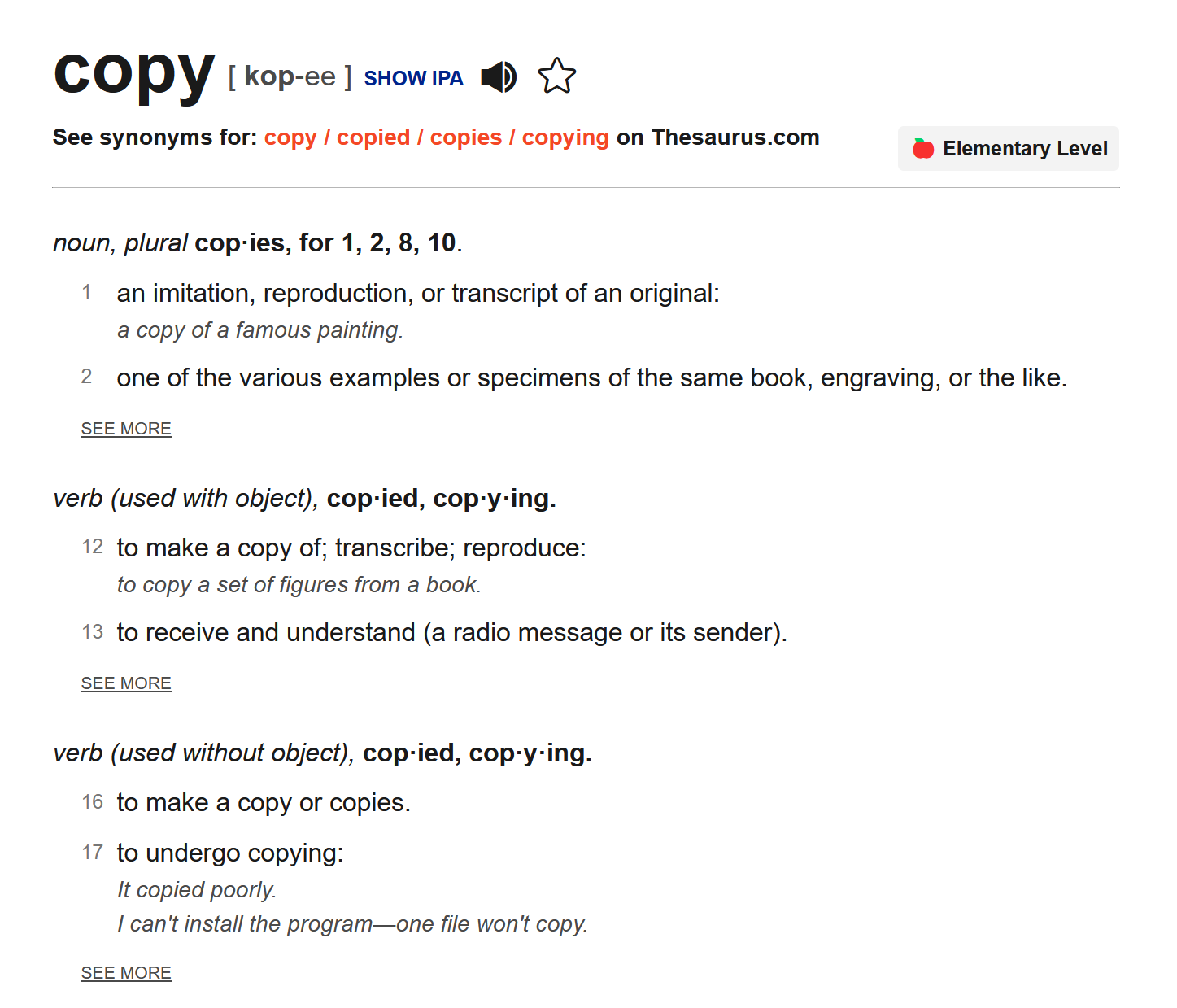What is writing copy and how is it different from content writing?
We talk a lot about avoiding copying and republishing content from the Internet. What each of us posts on the Internet must be distinctive.
As a result, a reader inquired as to why we discussed creating “copy” for websites.
So, what’s the deal with writing copy?

It’s a phrase that predates the Internet by decades. Professional writers usually create “copy” for newspapers, journals, or books.
But why do they use the word “copy” when the work must be unique? I discovered this on dictionary.com:
So it appears that a copy is a work intended to be copied—printed or reproduced.
Is that correct?
On answers.com, I discovered the following definition:
Copy is derived from the Latin “ad copy,” which means “to furnish,” and can be traced back to the Greek “ad copium,” which means “to nourish” or “to give.” In today’s world, the advertising business uses the term to describe how to write words that make people want to buy a certain service or product.
Hmm.
I’m no classical scholar, but that doesn’t ring true to me—”ad copies,” really?
Or do you have a better idea?
There’s also Copywriting
It is not copywriting (one word), but rather two-word copywriting. Or even copyright—go to your lawyer about that.

Originally the domain of advertising copywriters (not copywriters), the term “copywriting” now refers to writing marketing content such as advertising, direct mail, public relations, brochures, and scripts for radio, TV, and salespeople. Now we’re adding website pages, blogs, podcast scripts, text on infographics, and other words.
Some individuals, I believe, incorrectly refer to the finished piece as “the copywriting.”
Is Writing Content the Same as Writing Copy?
For many people these days, they are interchangeable. For many years, I’ve contended that content includes anything that shows on a website, such as photographs, videos, diagrams, infographics, and PDFs, and not simply words. Because it is made up of words, I create “copy.”
However, just as I had to stop writing about “websites” (sites on the Web) and now refer to them as “websites,” I’ve been speaking in terms of content since that’s what most people expect me to call it.
But I’m digressing.
A copy can be used in the content but does not have to be.
Copy vs. Content Writing: What’s the Difference?
When most people think of professional writers, they envision hotshot copywriters. These creatives are throwing concepts around, landing big accounts, and generally dazzling everyone around them with their ability to tell a captivating tale that sells items.

Content marketing has become just as (if not more!) more vital than traditional copywriting in today’s digital marketplace.
- But what exactly is the difference between copy and content?
- What distinguishes them, and what unites them?
- When both brands and freelancers use these terms interchangeably, what type of business should you claim to offer?
9 Different Types of Writing Copy
- Plain copy
- Long copy
- Storytelling copy
- Conversational copy
- Rejection copy
- Killer-poet copy
- Direct-from-CEO copy
- Frank copy
- Superlative copy
A Beginner’s Guide to Copy and Content Writing
Is there a distinction between copy and content writing? It depends on whom you ask. However, these two definitions are a good place to start:
“Copywriting” is written content that is communicated through online media and print publications. Copy content is mostly utilized for advertising and marketing. This form of written material is frequently utilized to convince an individual or group, as well as to increase brand awareness.”
In publishing, art, and communication, content is the information and experience(s) intended for an end-user or audience.”Content” is defined as:
“something to be expressed through some medium, such as speech, writing, or any of the other arts.”
As you can see, copywriting is content, but the content is not copywriting (sort of like how a square is a rectangle). Content can include videos, infographics, photos, and other elements in addition to writing.
Confusion reigns supreme.
What keywords do you use when looking for a job as a content writer? Are you a content marketer or a copywriter?
Consider this job advertisement. I discovered it the other day while hunting for an SEO copywriter.
Despite the title “SEO Copywriter,” the individual will “produce unique web content and update current online content.” The term “results-driven SEO and copy content” appears in the job description at one point.
What exactly is content copy?
The author of a blog post by Revenance says that copy is anything that is part of the sales funnel, like blog posts, social media updates, and email newsletters. Content is news, press releases, video transcripts, and product descriptions.
I’m not convinced. I believe that content marketing entails giving excellent tips and insights in order to attract a suitable audience, which may subsequently turn into leads and, eventually, consumers.
Copywriting, in my opinion, is the text that asks the audience to take a certain action, such as on a sales page, an advertisement, or direct mail.
Clearly, brands use the terms interchangeably, and they are defined differently depending on whom you ask. So, which one should you go with?
Make a decision for yourself and ask yourself, “Why?”
Because there is widespread misunderstanding about the distinctions between copy and content, you can define each category on your own terms and expect them to be used interchangeably depending on whom you deal with. Because it’s longer form, as this blog post, and I virtually always give advice, I consider the majority of my work to be content.
I THINK ABOUT COPYWRITING when I make a landing page, email, or advertisement for a customer.

I frequently say that copywriting necessitates a great deal of focus on a single short phrase. For instance, when I write a headline, I treat it as if it were a copy. It must persuade someone to read the blog article I’ve written.
Even if it is only a few words, each one is important.
But it makes no difference what you call it. When you begin working on a project, it’s more necessary to ask yourself why the written word is needed than if it’s copy or content. Why is it necessary to create a landing page? To market things and persuade customers to switch. What is the point of writing a blog post? Frequently to educate an audience.
When working on a writing project, the most important thing to remember is to explain your abilities effectively. I propose employing their terms to speak the same language as your clients or coworkers. When meeting with a prospective company or a recruiter, try to be as specific as possible.
Don’t say, “I write copy.”
Instead, say you’ve created conversion-focused landing sites and printed mailers. This will ensure that everyone understands what you do.
It’s fine if the recruiter I met with uses different words to describe the services I provide. A content developer must figure out what you’re good at and present samples to everyone interested. We may all have different notions about what copy and content are. Still, by asking questions and having an open dialog, we may all end up on the same page.
Writing a copy? Don’t forget to use Grammarly to check your copy!
What is Writing Copy? Conclusion
Writing copy is both an art and a science. It’s considered an art since it necessitates imagination, a sense of beauty, and style — as well as a certain aptitude, mastery, and specialized knowledge. You may use artistic advertising to generate content marketing that is practical convincing and, awe-inspiring and magnificent.
FAQ
What Does Write Copy Mean?
Writing copy represents the practice of developing marketing-related texts for advertisements. The words you notice in advertising materials and website pages, social media content and product descriptions serve as tools to make people take desired actions such as purchasing items or initiating new membership or clicking on links.
When executing copywriting one needs to select specific language which attracts viewers while producing measurable outcomes.

Lorelei has been an online entrepreneur, marketer and writer since 2006. Her biggest passion is WordPress, which is why she switched to being a full-time blogger 20 years ago and hasn’t looked back since. With so many years of experience behind her, she is an expert in copywriting, SEO, marketing and business strategies.






